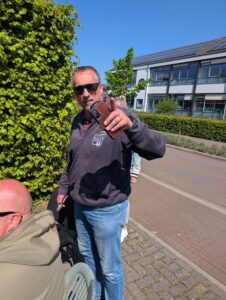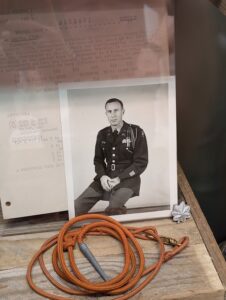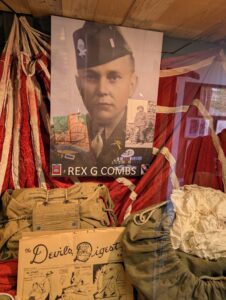https://www.youtube.com/shorts/GAcqWchokQ4

Living memories of that time are almost gone, except for a few men and women who were children at the time, who grew up with a war that ended here 80 years ago, on May 5, 1945. That day will be celebrated as Liberation Day, the start of “tachtig jaar van vrede en vrijheid,” 80 years of peace and freedom.
As an American I can barely imagine such a thing as peace. The United States has been in a state of continuous war ever since Pearl Harbor. First with the Axis, then with the Soviet Union, then with Arab states, and now (maybe) with China. I have a nephew serving now in Poland, and I worry about him every day.
The Netherlands has been spared and been rebuilt, better than ever before. After six weeks enjoying its cities and countryside I wanted to think about where all this beauty began. While everyone else was celebrating “King’s Day,” the official birthday of King Willem Alexander, wearing orange, drinking, dancing, and making a mess in every public space they could find, I traveled to Mook, a small town south of Nijmegen.
I was met at the train station by Frits Janssen, who has made it his life’s work to keep the memories alive. He has transformed the front of his house into a museum to the battle that came to his town that September.
The Battle

Getting an army north required the securing of bridges by paratroopers. By this time the bridges at Nijmegen and Molden were gone, blown up by the Germans. The only bridge left was at Mook, and as Frits told me, “The order came out. Mook had to be held at all costs.”
The job fell to the 505th Battalion of the 87th Airborne Division. Its commander was Talton Long, whose daughter is now a neighbor of mine on the edge of Atlanta. Janssen’s museum has two photos of Long, along with other memorabilia, including an orange lanyard that participants were awarded after the battle.
The town was destroyed. In the end, the entire battle was a failure. CBS correspondent Bill Downs later called Nijmegen “…a single, isolated battle that ranks in magnificence and courage with Guam, Tarawa, Omaha Beach. …a story that should be told to the blowing of bugles and the beating of drums.”
The Memories

But in Janssen’s museum, they’re all young men still. One man whose uniform and picture stand proudly behind glass is Lt. Isaac Michelman, a Jewish officer whose fate would be horrific were he captured. Another man, Rex Combs, later became a lawyer fighting the mob in Boston, and lost a son in Vietnam. At the time they fought in Mook many of these men weren’t out of their teens yet.
Janssen has their stories memorized, both tales of their heroism and of the lives that came after. They’re all alive in his imagination and in his exhibits. He knows precisely where the key points were during the fight, places that are now just ordinary bridges and roads, but for a few days were worth dying for.

The Legacy
But the legacy of the 505th and the Battle of Mook hit differently for me. Mook is a peaceful town, miles from anywhere. After I left Frits I saw dozens of young people, the same age as those who fought then, filling the small train platform, anxious to reach Nijmegen and the King’s Day party taking place there. They have no memories of war, neither do their parents, nor many of their grandparents.
They’re what the fight was about and their laughter is the victory.
Happy Liberation Day.









